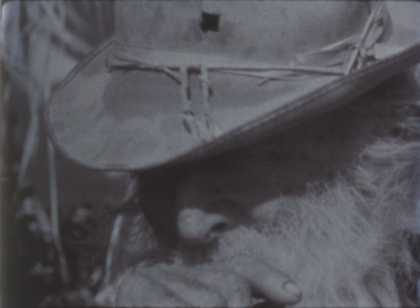I start out on a quest. Thus, again I am speaking of a man in the past, a hero-maker, a storyteller, an image-maker, with whom I was vitally concerned ŌĆō gradually; I didnŌĆÖt know any initial point I was concerned with in general, but I was concerned with heroes. Just like a warrior, this poet would start when it was time to start, not knowing really particularly where. And then where he found himself ŌĆō places that began to tell him where he was bound ŌĆō he then, of course, began to know about where he was after all.
Ą■░∙│▄│”▒╠²Ą■▓╣Š▒▒¶▒¶Š▒▒
This programme presents two works that explore the imagistic heroic with which Baillie identified. Together with Mass, Quixote and To Parsifal are the last in which the filmmaker was not only learning technique, but discovering himself, often by way of these heroic┬Āforms.
Bruce Baillie, Quixote, USA 1965, 16mm, colour and black and white, sound, 45┬Āmin
Originally intended for two simultaneous screens and encapsulating the filmmakerŌĆÖs first period of work, Quixote is a kind of summary and conclusion of a number of themes, especially that of the hero ŌĆ” depicting Western orientation as essentially one of conquest. The film is conceived in a number of different styles and on a number of simultaneous┬Ālevels.
ŌĆśThe Vietnam War was an essential expression of our American (Occidental, Christian) way of comprehending the world, ourselves, history; that is a reason for its thematic appearance in Quixote. The presentiment at the end of the film is of the end we have created for ourselves.ŌĆÖ
Ą■░∙│▄│”▒╠²Ą■▓╣Š▒▒¶▒¶Š▒▒
Bruce Baillie, To Parsifal, USA 1963, 16mm, colour, sound, 16┬Āmin
ŌĆśTribute to the hero, Parsifal ŌĆ” the European legend as basic structure, as well as the hero ŌĆ” ŌĆ£He who becomes slowly wise.ŌĆØ (Wagner, Parsifal) ┬ĀPromised land, I suppose ŌĆ” the last temptation ŌĆ” time, flesh, etc ŌĆ” Off the coast, at sea, the mountains and the ŌĆ” slow freight trains through the passes; the Wagnerian spirit, ancient Christian legend. Compassion for nature, pursuit (of Eternal Life) through the heroic form.ŌĆÖ
Ą■░∙│▄│”▒╠²Ą■▓╣Š▒▒¶▒¶Š▒▒
Introduced by Garbi├▒e Ortega, series┬Ācurator
Tate Film is supported by LUMA┬ĀFoundation

